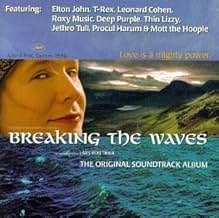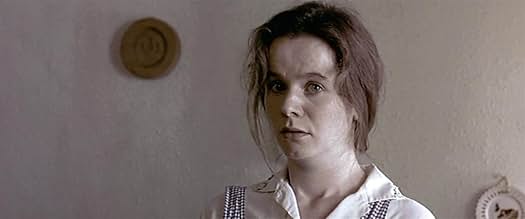Oilman Jan fica paralisado em um acidente. Sua esposa, que orou por seu retorno, se sente culpada; ainda mais, quando Jan a incentiva a fazer sexo com outra pessoa.Oilman Jan fica paralisado em um acidente. Sua esposa, que orou por seu retorno, se sente culpada; ainda mais, quando Jan a incentiva a fazer sexo com outra pessoa.Oilman Jan fica paralisado em um acidente. Sua esposa, que orou por seu retorno, se sente culpada; ainda mais, quando Jan a incentiva a fazer sexo com outra pessoa.
- Direção
- Roteiristas
- Artistas
- Indicado a 1 Oscar
- 45 vitórias e 28 indicações no total
Finlay Welsh
- Coroner
- (as Finley Welsh)
- Direção
- Roteiristas
- Elenco e equipe completos
- Produção, bilheteria e muito mais no IMDbPro
Avaliações em destaque
Emotional power is one of the most difficult and complex aspects of film-making to succeed in. Very few films can manage to be emotionally destructive, while still retaining the viewer's concentration and dedication to the piece. Yet, Breaking the Waves is a film that holds more emotionally power that most films, it is not a film you will want to see again. One viewing is enough (at least for a long period of time). Bearing in mind, you will feel devastated by the film's self-destructive nature and after viewing such an unforgettable story of heart ache and sadness you will have etched into the back of your mind.
Breaking the Waves is a complicated story; it is one that studies love, regret, guilt, madness and religion. Breaking the Waves is set in a small religious town deep in Scotland and tells the sorrowful story of the innocent Bess (Emily Watson) and her lover Jan (Stellan Skarsgaard). Jan becomes paralysed in a freak accident at the oil-rig he is working on and asks his estranged wife Bess to have sex with other men and then tell him what it was like to keep their relationship stable.
Lars Von Trier, the founder of Dogme film-making creates a drama that remains in a league of its own. Though Breaking the Waves is not Dogme film-making (like The Idiots) it still has elements of Dogme film-making style littered around it. The film is separated into chapters, which work as wonderful mood and symbolic transitions. These sequences are a single shot focusing on something that is considerably impressive, with the added touch of a brilliantly chosen song to fit the mood. The film's general direction is one that feels like it has been shot with a hand-held style.
The film studies many questionable elements of life, including topics such as death, terminal illness, spirituality, emotions and hypocrisy in religion. These are just a view of the talking points that crop up throughout the long running-time. The film asks the viewer questions and most importantly tests how much harrowing devastation you can handle. There is no denying just how pure Breaking the Waves is.
Emma Watson gives a career defining performance with her pitiful role of a naive young woman, who just wants to be free from pain. The performance is very painful to watch because it is so unbearably realistic. You become apart of her journey and watch her emotions and sanity spiral out of control, even from the people who love her. Heartbreaking in every way.
Breaking the Waves is a difficult film and one that is not for everyone, though I say it is a film which deserves the critical acclaim it gets.
Breaking the Waves is a complicated story; it is one that studies love, regret, guilt, madness and religion. Breaking the Waves is set in a small religious town deep in Scotland and tells the sorrowful story of the innocent Bess (Emily Watson) and her lover Jan (Stellan Skarsgaard). Jan becomes paralysed in a freak accident at the oil-rig he is working on and asks his estranged wife Bess to have sex with other men and then tell him what it was like to keep their relationship stable.
Lars Von Trier, the founder of Dogme film-making creates a drama that remains in a league of its own. Though Breaking the Waves is not Dogme film-making (like The Idiots) it still has elements of Dogme film-making style littered around it. The film is separated into chapters, which work as wonderful mood and symbolic transitions. These sequences are a single shot focusing on something that is considerably impressive, with the added touch of a brilliantly chosen song to fit the mood. The film's general direction is one that feels like it has been shot with a hand-held style.
The film studies many questionable elements of life, including topics such as death, terminal illness, spirituality, emotions and hypocrisy in religion. These are just a view of the talking points that crop up throughout the long running-time. The film asks the viewer questions and most importantly tests how much harrowing devastation you can handle. There is no denying just how pure Breaking the Waves is.
Emma Watson gives a career defining performance with her pitiful role of a naive young woman, who just wants to be free from pain. The performance is very painful to watch because it is so unbearably realistic. You become apart of her journey and watch her emotions and sanity spiral out of control, even from the people who love her. Heartbreaking in every way.
Breaking the Waves is a difficult film and one that is not for everyone, though I say it is a film which deserves the critical acclaim it gets.
Without a doubt, this is one of the most emotionally devastating films I've ever seen in my life. It seems to be a rumination on the true nature of goodness. Bess is a simple creature and her purity and innocence are delivered by Emily Watson in a heartbreaking performance that you will not soon forget. It is a crime that Watson didn't win Best Actress for this role, though I imagine that many voters were turned off by the disturbing subject matter of this film. I had a visceral reaction to the film in the form of serious physical and emotional discomfort. I had rented it, and actually had to stop it at several points and give myself some time to recover before continuing on. I'm not sure it's a film that I'd ever want to see a second time, but I believe it is a true work of art and am grateful to have seen it.
8sol-
A film about love, faith, religion and many other things, it is a draining experience but yet fascinating to watch, with superb acting and an intriguing main character. It is surprising how gripping the film is, as it is difficult to watch, not just because of the subject matter, but also because of its style. Made by the conventions of Dogme '95, the film has many extreme close-ups, generally shaky camera-work and errors in continuity for editing and audio levels, all of which is supposed to amount to a film that looks and feels more realistic. With this film though, the quality of the acting and writing provide enough realism alone, and therefore the style serves no purpose other than to make the film more difficult to digest. It is an incredibly long film, and while this is not too much of a problem, the chapter markers are noticeably long without much reason either. Still, the film comes through despite its detracting bits. Watson, in her first film performance, is excellent, and Cartlidge provides great support. This is not an easy film to watch and like, but it is easy to admire what is done well in the film.
There had not been a lot of movies I'd seen in a very long time, where the act of embracing one's faith in a greater power, and an unselfish, all-encompassing belief in unconditional love and trust were so vividly and powerfully portrayed. CROUCHING TIGER, HIDDEN DRAGON so invests its characters with these traits, that I thought I would never see another film to rival it in this respect. I was sadly mistaken.
Neither Emily Watson or Stellan Skarsgard are as conventionally attractive as the kind of actors you would find in a big budget Hollywood production. Yet in their love scenes as Jan and Bess, I believe we get our very first glimpse on film of what sex between two people is meant to be as the Man Upstairs intended; not something dirty or vile or wanton, or anything as icily clinical as the conditions prescribed by Mother Church, but as a gift to us to be enjoyed, and therefore in turn the greatest gift that any one person can give to another as a sign of love and affection. That alone makes Skarsgard and Watson two of the sexiest, most passionate actors ever to make love on screen; they invest that much into Jan and Bess. I very nearly cried when Bess tells Jan in the throes of passion "Thank you." So deep, tender and uncalculating is her love for him, that he can't help but return it. Few of us will ever know a love of that capacity or intensity in our lifetimes.
Which is what makes this film's conceit easier to accept, and that much harder to bear. In these hard and cynical times, it would be easy to dismiss Bess as a feeble-minded idiot and have done with it. Had director Von Trier seen her story in that way, this would've been a pretty short film.
But when our love for another and our faith is all we have, no matter how misguided it is, no one has the right to question or debunk it, no matter how well-meaning they are. I don't think that Bess' fate could've been altered or avoided no matter how her husband's doctor, her mother, or her sister-in-law Dodo had tried to approach the situation. Her love for Jan and her faith in God are what simultaneously nourished, sustained, uplifted and destroyed her. At the end, she was afraid that maybe she had made a mistake investing herself in making the ultimate sacrifice, and maybe that's what Von Trier was trying to say with that ending, which I'm sure turned off a lot of viewers. If the sacrifices you make are in quest of such love and spirituality, then you can never be wrong.
That's a heady message, and a dangerous one if it is taken out of context. But for those who would condemn this film, I can only say this: you're not paying attention. BREAKING THE WAVES is a film about a woman fallen into promiscuity, the same way that BOOGIE NIGHTS is about a bunch of sleazy pornographers. If you're only looking at the surface, you shouldn't be questioning the content, but your own lack of vision.
Neither Emily Watson or Stellan Skarsgard are as conventionally attractive as the kind of actors you would find in a big budget Hollywood production. Yet in their love scenes as Jan and Bess, I believe we get our very first glimpse on film of what sex between two people is meant to be as the Man Upstairs intended; not something dirty or vile or wanton, or anything as icily clinical as the conditions prescribed by Mother Church, but as a gift to us to be enjoyed, and therefore in turn the greatest gift that any one person can give to another as a sign of love and affection. That alone makes Skarsgard and Watson two of the sexiest, most passionate actors ever to make love on screen; they invest that much into Jan and Bess. I very nearly cried when Bess tells Jan in the throes of passion "Thank you." So deep, tender and uncalculating is her love for him, that he can't help but return it. Few of us will ever know a love of that capacity or intensity in our lifetimes.
Which is what makes this film's conceit easier to accept, and that much harder to bear. In these hard and cynical times, it would be easy to dismiss Bess as a feeble-minded idiot and have done with it. Had director Von Trier seen her story in that way, this would've been a pretty short film.
But when our love for another and our faith is all we have, no matter how misguided it is, no one has the right to question or debunk it, no matter how well-meaning they are. I don't think that Bess' fate could've been altered or avoided no matter how her husband's doctor, her mother, or her sister-in-law Dodo had tried to approach the situation. Her love for Jan and her faith in God are what simultaneously nourished, sustained, uplifted and destroyed her. At the end, she was afraid that maybe she had made a mistake investing herself in making the ultimate sacrifice, and maybe that's what Von Trier was trying to say with that ending, which I'm sure turned off a lot of viewers. If the sacrifices you make are in quest of such love and spirituality, then you can never be wrong.
That's a heady message, and a dangerous one if it is taken out of context. But for those who would condemn this film, I can only say this: you're not paying attention. BREAKING THE WAVES is a film about a woman fallen into promiscuity, the same way that BOOGIE NIGHTS is about a bunch of sleazy pornographers. If you're only looking at the surface, you shouldn't be questioning the content, but your own lack of vision.
I just finished watching "Breaking the Waves" and am still not sure whether it was a good film or a strong piece of manipulation. Perhaps there is ultimately no difference.
Emily Watson was luminous and altogether convincing, and the camerawork didn't bother me in the slightest. On the contrary, it suited the story immensely - as did the deliberately washed-out palette. A brilliant invocation of a time and place.
However, the story left me feeling like I'd just watched someone kicking a puppy ... for several hours. I dislike the implication that such brutal and violent self-sacrifice can be justified by intense love, and to have this line wrapped up in a dewy religious shroud is a cop-out. It's like watching a documentary about the horrors of sideshow life - with plenty of explicit segments starring the freaks themselves. Allows an audience to moralize and yet be voyeurs at the same time.
Poor Bess was more than naive - whatever brain she was born with was utterly starved of oxygen by the narrow and restrictive community she was born into. I sympathized most with Dodo, who of them all loved Bess the most, and the least selfishly.
I find myself very angry after seeing "Breaking the Waves", which is why I cannot say that I disliked this film. Had I truly disliked it, my response would be less emotional.
Emily Watson was luminous and altogether convincing, and the camerawork didn't bother me in the slightest. On the contrary, it suited the story immensely - as did the deliberately washed-out palette. A brilliant invocation of a time and place.
However, the story left me feeling like I'd just watched someone kicking a puppy ... for several hours. I dislike the implication that such brutal and violent self-sacrifice can be justified by intense love, and to have this line wrapped up in a dewy religious shroud is a cop-out. It's like watching a documentary about the horrors of sideshow life - with plenty of explicit segments starring the freaks themselves. Allows an audience to moralize and yet be voyeurs at the same time.
Poor Bess was more than naive - whatever brain she was born with was utterly starved of oxygen by the narrow and restrictive community she was born into. I sympathized most with Dodo, who of them all loved Bess the most, and the least selfishly.
I find myself very angry after seeing "Breaking the Waves", which is why I cannot say that I disliked this film. Had I truly disliked it, my response would be less emotional.
Você sabia?
- CuriosidadesTheatrical film debut of Emily Watson. She received an Oscar nomination and was expelled from the School of Economic Science (the alleged cult she was brought up in) for her role in this film.
- Erros de gravaçãoThe film is set in the early 1970s, but the van featured prominently in the car park and heliport scenes is a mid-1980s Freight Rover 200, formerly known as the Leyland Sherpa.
- Citações
Dodo McNeill: Not one of you has the right to consign Bess to hell!
- Versões alternativasThe director's cut of the film, featuring explicit shots removed from the U.S. version for ratings purposes, is available on Criterion laserdisc.
Principais escolhas
Faça login para avaliar e ver a lista de recomendações personalizadas
Detalhes
- Data de lançamento
- Países de origem
- Idioma
- Também conhecido como
- Rompiendo las olas
- Locações de filme
- Empresas de produção
- Consulte mais créditos da empresa na IMDbPro
Bilheteria
- Orçamento
- DKK 42.000.000 (estimativa)
- Faturamento bruto nos EUA e Canadá
- US$ 3.803.298
- Faturamento bruto mundial
- US$ 3.831.182
- Tempo de duração2 horas 33 minutos
- Cor
- Mixagem de som
- Proporção
- 2.35 : 1
Contribua para esta página
Sugerir uma alteração ou adicionar conteúdo ausente

Principal brecha
What was the official certification given to Ondas do Destino (1996) in Japan?
Responda




























